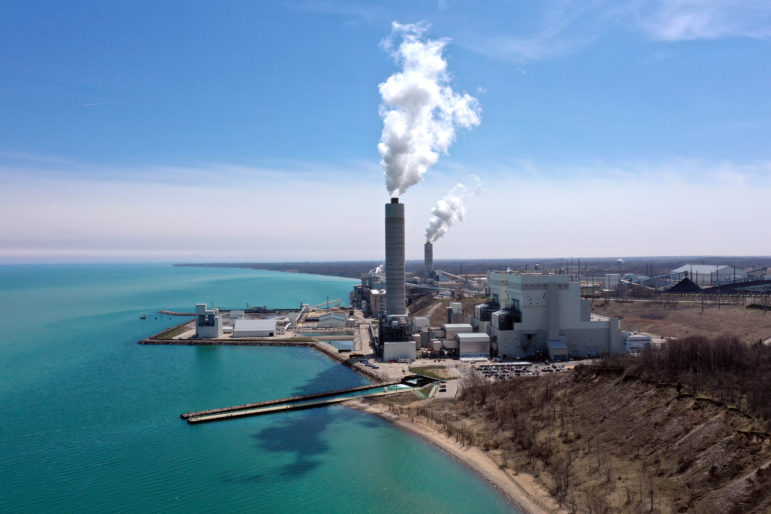We Energies Reduces Electric Cars’ Impact
Batteries charged on coal power aren’t so good for the environment.

We Energies’ Oak Creek Power Plant and Elm Road Generating Station are coal-fired electrical power stations. File photo by Coburn Dukehart/Wisconsin Watch.
Like most states, Wisconsin is going more green.
For instance, we are buying more electric cars. In 2018 state residents bought 1,956 electric vehicles, a 24% increase over 2017, when 1,576 EVs were purchased.
Add to that the growth of electric and battery powered lawn mowers, which are expected to register “an absolute growth of over 92% between 2016 and 2025” in the U.S.
And don’t forget electric and battery powered snow blowers, which by 2017 accounted for the largest share of the North American snow blowers market, as a market analysis noted.
That should mean a lot less air pollution, what with motor vehicles being responsible for 28% of all emissions in the U.S. and lawn mowers, believe it or not, causing as much as 5% of all pollution.
Except: where does the power come from when we plug in our car, mower or blower batteries to recharge them? The depends on what your local utility is using to power its electricity. If the power is coming from wind turbines, you get a 99% reduction in emissions, as a report by the Union of Concerned Scientists (UCS) concluded. It if comes from solar power you get a 92% reduction in emissions. But the story looks very different if your utility is using fossil fuels. Gas-powered electricity would yield only a 51% reduction in emissions. And coal-powered electricity would yield only a 1% reduction in emissions.
“As a general rule of thumb, its percentage of coal indicates whether the utility is providing electricity that has higher or lower global warming emissions intensity than the regional average,” the UCS study noted.
And We Energies, our local utility, has long been a coal colossus. As recently as 2005, about 70 percent of its power came from burning coal and it was still at 51 percent in 2017. Because of the leadership of companies like We Energies, just nine states in America were more dependent on coal than Wisconsin, and those tended to be states like West Virginia, Kentucky, Wyoming and North Dakota — big producers of coal.
We Energies, it should be noted, has made progress since 2015 in reducing the percent of coal used by its utilities, but it is still heavily dependent on fossil fuels, with 37% of power coming from coal, 32% from natural gas, and an unspecified portion of its “15% market purchases” coming from fossil fuels. Just 7% of its power comes from renewables and 3% from hydro power. Which is to say you are mostly exchanging your gas spewing car for a mix of gas and coal power when you decide to go electric.
But Scott Blankman of the environmental activist non-profit Clean Wisconsin says a study from two years ago found there was some benefit for the environment in this region for buyers of electric cars. And that should get better as We Energies grows its solar and wind power in the future, he notes.
When asked about the impact on electric cars from its mix of power sources, Brendan Conway, spokesperson for We Energies, points to the progress the company has made. “In recent years, we have cut carbon emissions more than 50%. We are on track to reduce emissions 70% by 2030 and make our electric generation fleet net carbon neutral by 2050.”
But if it’s going to take until 2050 to have a carbon neutral electric vehicle, that sounds like a very slow pace.
Blankman notes that of the five large coal burning units still being used by utilities, We Energies and its parent company, WEC Energy Group Inc, owns four of them. “We would like to see them retire them more quickly,” he says.
But Elizabeth Ward, Chapter Director of the Wisconsin Sierra Club, notes that “We Energies and WEC, their parent group, plan to continue burning coal at their giant Elm Road coal plant in Oak Creek and at their Weston plant in Stevens Point. In fact, the company’s Executive Chair skeptically referred to President Biden‘s goal of a carbon-free power sector by 2035 as a ‘moonshot’ and stated his intentions to run the larger of the company’s remaining coal plants ‘through mid-century.’”
The company is far behind in embracing renewables, she charges, and “needs five-to-ten times as much clean energy as they have now. We Energies needs to pick up the pace.”
Which, if they did, would be great news for current and future buyers of electric vehicles.
Murphy's Law
-
National Media Discovers Mayor Johnson
 Jul 16th, 2024 by Bruce Murphy
Jul 16th, 2024 by Bruce Murphy
-
Milwaukee Arts Groups in Big Trouble
 Jul 10th, 2024 by Bruce Murphy
Jul 10th, 2024 by Bruce Murphy
-
The Plague of Rising Health Care Costs
 Jul 8th, 2024 by Bruce Murphy
Jul 8th, 2024 by Bruce Murphy




















Only three left in the state without a end date in the next few years – Elm Road, Madgett and Weston. Madgett is 42 years old and 390 MW, it could close any day and I wouldn’t be surprised. Agreed the other two are a challenge. They are both brand new (in coal plant years anyways), and it is clear WEC is loathe to let a single cent of profit from their investment go by. We’ll see what the state PSC can do with how costs of those plants are handled in closures now that it has an Evers majority.
My ‘sense’ is that Wisconsin is very NIMBY towards wind, and there is too much local control alas. I also have my eye on how the test Great Lakes offshore wind farm in Ohio turns out, but so far the NIMBYs are winning against that too with bird regulations. It sure looks like investors aren’t scare to put up solar wherever they can so that is good news, and probably the best path forward for Wisconsin along with more interconnections and storage.
Lastly – yes it is absolutely ridiculous that the only states that burn more coal are the ones who mine it. There are zero coal mines in Wisconsin! Lets make our own electricity another way!
This situation is also salient in the decision of MCTS to turn over their bus fleet to electric. My feeling is more electric vehicles and pressure on WE Energies will be better than not doing anything about the problem. The development of the Electric Ford Mustang should be a clarion call for change if there ever was one.
And how many EVs would be sold in Wisconsin if our archaic franchise laws protecting auto dealers (many owned out of state) were changed to allow Tesla to sell here? On one hand the dealers brag about how their sales are moving online, while on the other hand actively blocking sale of a U.S. designed car, built in the U.S. by union labor. Give us a fair choice!